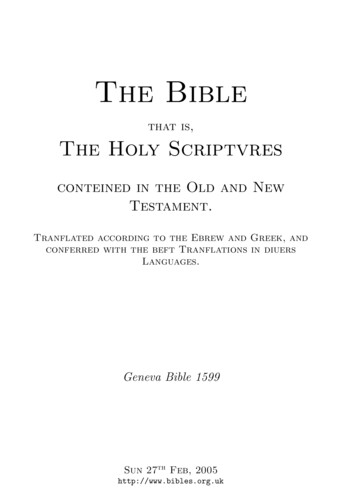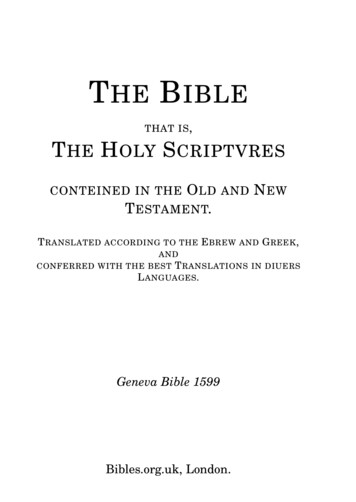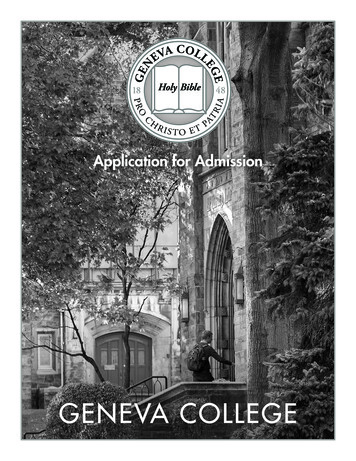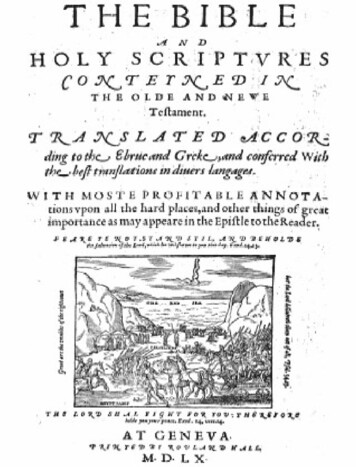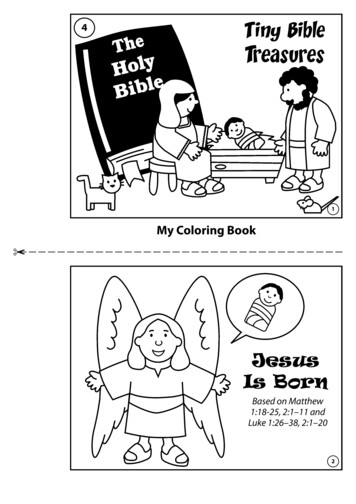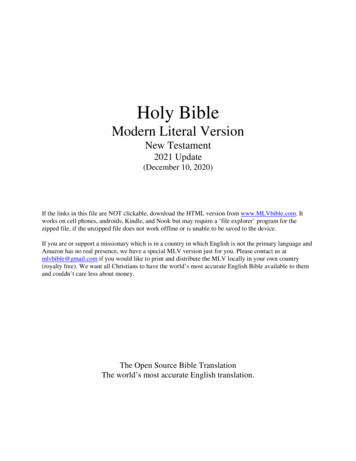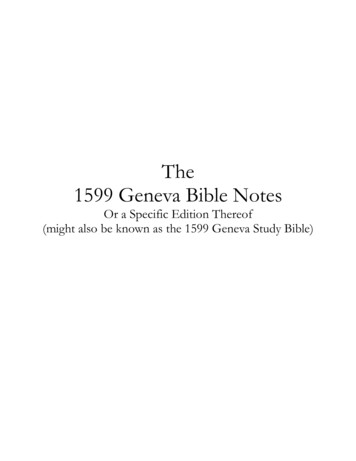
Transcription
The1599 Geneva Bible NotesOr a Specific Edition Thereof(might also be known as the 1599 Geneva Study Bible)
There is no copyright associated with this ebook. You may share, reuse and redistribute as desired.Version 1.0 (June 2018)
IntroductionThe Geneva Bible is one of the most historically significant translations of the Bible into English,preceding the King James Version by 51 years. It was the primary Bible of 16th-century EnglishProtestantism and was used by William Shakespeare, Oliver Cromwell, John Knox, John Donne, andJohn Bunyan, author of The Pilgrim's Progress (1678). It was one of the Bibles taken to America onthe Mayflower (Pilgrim Hall Museum has collected several Bibles of Mayflower passengers). TheGeneva Bible was used by many English Dissenters, and it was still respected by Oliver Cromwell'ssoldiers at the time of the English Civil War, in the booklet "Cromwell's Soldiers' Pocket Bible".The Geneva Bible Notes are marginal notes on the Geneva Bible written by John Calvin and otherleaders of the Reformation. This commentary is interesting for its unrelenting effort to build avision of Christianity that, according to the Reformers, reflected the early Church’s doctrines andbeliefs. The Geneva Bible and its notes probably shaped the religious worldview of the fiercely devoutand God-fearing early generations of Americans. It was Michael Hoffman’s book Usury inChristendom: The Mortal Sin that Was and Now is Not that introduced me to the Geneva Bible Notes for itsupholding of the ban on usury (see the note on Luke 19:23). According to Hoffman, a ban on usurywas the Church’s standard practice for the first 1500 years of its existence, while today the Vaticanearns tens of millions of dollars from usurious investments alone, and even Christians as strict asthe Amish profit by usury according to my own research.Despite its great historical importance, there is no free ebook version of this commentary availableon the Internet that present this particular edition’s notes, therefore I created this for my own useand the use of others. Only verses that had commentary are included. The text is taken from theSacred Texts website without any modification, except for the addition of this introduction, a tableof contents and chapter headings.Geneva Bible editionsApparently the Geneva Bible ands its notes went through hundreds of reprintings. Some versions ofthe King James Bible were published with the Geneva Bible’s notes on the margins of th verses (as lateas 1715). I have spend many hours trying to ascertain whether this text is really the notes on the1599 Geneva Bible, reading scholarly journal articles, looking at some ancient manuscripts and readingonline discussions. I used the note on Luke 19:23 to compare the various available editions. Lookingat an actual scan of a 1560 edition, I saw that it uses the word “vantage” instead of “usury”, and itsnote on Luke 19:23 merely says “To the bankers and changers”. Some versions of the notesavailable in PDF edition online claiming to be the 1599 edition have these exact features. Yet thereare numerous well-established Bible sites that claim to be shown the 1599 edition and that use theword “usury” and have the long note on Luke 19:23. I also found a website that claims to offer a1587 edition of the Geneva Bible and its notes (http://ecmarsh.com/Geneva/default.html) thatseems to be nearly the same as the 1599 edition offered in this file here except for its use of old
spellings. I also found a 1610 Geneva-style Bible that has the names of some of the writers involvedwith the original Geneva Bible which uses the word “vantage” rather than “usury” and has the shortnote on Luke 19:23.Then there is the issue of the 1599 Geneva Study Bible about which there seems to be zeroinformation online apart from some well-established sites offering it for viewing in website format.This supposed 1599 Geneva Study Bible is actually exactly the same as the notes offered in this file youare reading. There is a website that attacks this 1599 Geneva Study Bible for not being a “true” Genevabible, however, information I found elsewhere suggests that that might simply be due to the websitemaker’s lack of knowledge of the history of the Geneva Bible. The website for the 1587 edition hasthis introduction (and confusingly uses “Geneva Study Bible” and “Geneva Bible” interchangeably):The two other most significant editions of the Geneva Bible are the 1587 Tomson NewTestament edition and the use of the notes of Franciscus Junius on Revelation from 1599 on.Also of note are the Geneva Bible editions of 1568-1570, which contain Calvin’s Catechism,and later editions which included Calvinistic doctrine as catechism.Lawrence Tomson brought out a New Testament in 1576, based on Beza’s Greek and LatinNew Testaments, and using Beza’s Latin New Testament notes. Tomson’s New Testament,including the margin notes, replaced the Geneva 1560 New Testament in a 1587 quartoedition of the Geneva Bible. While there were some changes in the biblical text, the majordifference in the Tomson New Testament was in the margin notes. Some readers continuedto prefer the Geneva Bible 1560 New Testament version. This resulted in some GenevaBibles having the 1560 New Testament and notes and others having Tomson’s NewTestament and notes, from 1587 on.Further complicating matters is that the verses quoted in this text seem to be exactly the same asthose in the King James Version, so this text might as well be a 1611 King James Version with thenotes of the 1599 Geneva Bible added to it.There is a 1599 Geneva Bible published in 2007 by the Tolle Lege Press in 2007 that uses the 1560style notes and its own style of translation that differs from the KJV.So it appears that the present text is made up of the 1611 KJV along with marginal notes from a1599 Geneva Bible (assuming multiple versions were printed in that year) that used the notes from the1587 edition. It is possible that what you see here is the result of some publishing house printing aversion of the KJV with notes from a specific 1599 Geneva Bible and called it the 1599 Geneva StudyBible.Whatever the case, we can be reasonably certain (unless dozens of high-profile Christian sites havebeen duped) that the notes presented here are really by John Calvin and/or members of hismovement.
If you have more information on this matter, please let me know by email atcontact@hawramani.com.To get the newest versions of this file please go to: http:/hawramani.com/1599-geneva-bible-notes/Ikram HawramaniArizona
This page intentionally left blank
ContentsGenesis . 1Exodus. 117Leviticus. 211Numbers . 277Deuteronomy. 365Joshua. 453Judges. 507Ruth . 5591 Kings (1 Samuel) . 5672 Kings (2 Samuel) . 6413 Kings (1 Kings) . 7054 Kings (2 Kings) . 7731 Chronicles . 8452 Chronicles . 908Ezra . 999Nehemiah . 1021Esther . 1050Job . 1070Psalms . 1188Proverbs . 1504Ecclesiastes . 1578Song of Solomon (Canticles) . 1608Isaiah . 1625Jeremiah . 1839Lamentations . 2008Ezekiel. 2024Daniel . 2139Hosea. 2194Joel . 2231Amos . 2240Obadiah . 2263Jonah . 2266
Micah . 2275Nahum . 2293Habakkuk . 2300Zephaniah. 2310Haggai . 2319Zechariah. 2324Malachi . 2362Matthew . 2376Mark . 2480Luke . 2536John . 2627Acts . 2708Romans . 28211 Corinthians . 29062 Corinthians . 2988Galatians . 3035Ephesians . 3065Philippians. 3094Colossians .
Geneva Bible was used by many English Dissenters, and it was still respected by Oliver Cromwell's soldiers at the time of the English Civil War, in the booklet "Cromwell's Soldiers' Pocket Bible". The Geneva Bible Notes are marginal notes on the Geneva Bible written by John Calvin and other leaders of the Reformation. This commentary is interesting for its unrelenting effort to build a
